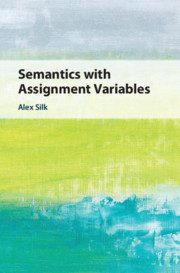Refine search
Actions for selected content:
4 results

Semantics with Assignment Variables
-
- Published online:
- 09 July 2021
- Print publication:
- 24 June 2021
1 - Introduction
-
- Book:
- Semantics with Assignment Variables
- Published online:
- 09 July 2021
- Print publication:
- 24 June 2021, pp 1-14
-
- Chapter
- Export citation
10 - Taking Stock
- from Part III
-
- Book:
- Semantics with Assignment Variables
- Published online:
- 09 July 2021
- Print publication:
- 24 June 2021, pp 230-232
-
- Chapter
- Export citation
2 - Preliminaries
- from Part I
-
- Book:
- Semantics with Assignment Variables
- Published online:
- 09 July 2021
- Print publication:
- 24 June 2021, pp 17-22
-
- Chapter
- Export citation
